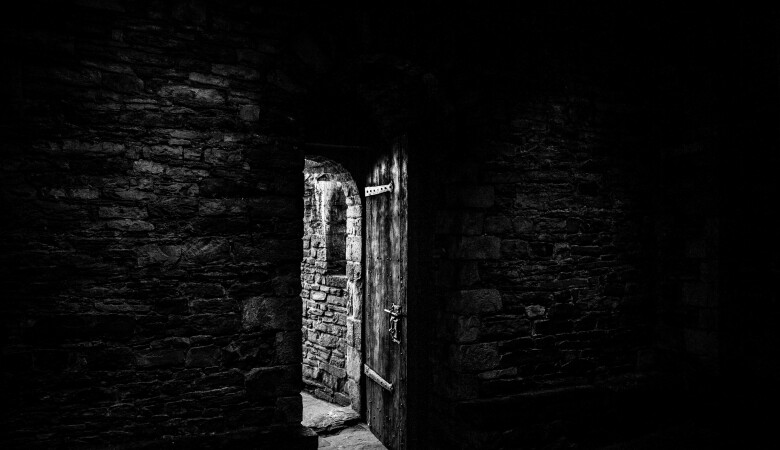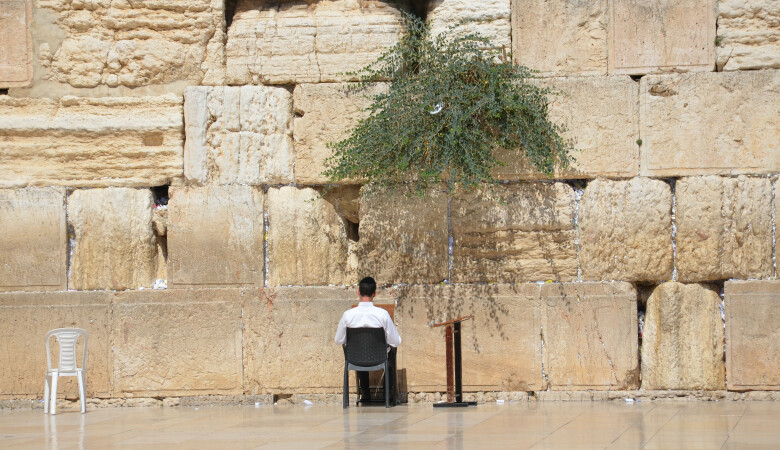Series: Mark
The Resurrection of Jesus Christ (Sermon Mark 88)
May 05, 2024 | Andy Davis
Mark 16:1-8
Exclusivity of Christ, Resurrection of Christ
Jesus' earth-shattering resurrection obliterated death's reign and was proved by the women's witness of his empty tomb, his meetings with disciples, and the birth of Christianity.
- SERMON TRANSCRIPT -
For the second time this spring, we here at First Baptist Church get to celebrate Easter. I remember back in February, I think it was one of you asked me, "Oh, in the series in Mark, have you lined it up so that you will celebrate resurrection victory on Easter?” "Well, I missed by about a month." But that's okay. We get to celebrate the resurrection twice, and we as Christians have the opportunity to celebrate the resurrection of Jesus Christ every day of our lives. This is an opportunity as we continue to move through Mark, to focus on the truth of Christ's bodily resurrection from the grave. Look at Mark 16: 1-8. This morning I'm not feeling in any way confined to these verses in Mark. I'm going to feel the freedom to go over to Matthew and then back over to Luke and then something from John and back to Mark again. We're going to do that because I want to celebrate what Christ has done and the greatness of this celebration is in proportion to the greatness of the enemy that Christ triumphed over the enemy of death.
I. The Resurrection: The Climax of Redemptive History
Death is a vicious, cold-hearted tyrant. Paul writes in Romans, "Sin reigned in death, personifying death as a tyrant, a tyrannical emperor that has reigned." Death, has walked with cruel and bloody boots through the pages of human history, and not a single nation is exempt from death's tyranny all over the world. Every culture has lavish laments for the destruction brought about by death. The Bible itself is filled with deep and bitter laments over death. Think of the wailing of a mother over her dead child or of a man over a dead daughter or a friend over a lost friend or a spouse over a dead spouse. I would imagine that almost all of you of age listening to me today have experienced the death of a loved one or many loved ones, and you know how bitter that can feel.
How can we possibly measure the amount of sorrow that death has caused? Romans 5 makes the origin of death plain theologically. We would not know this except that the word of God teaches us. In Romans 5:12, "Sin entered the world through one man and death through sin. And in this way death came to all because all sinned." Adam violated God's command at the tree of the knowledge of good and evil and received the due penalty that God had ordained for his sin. But more than that, that chapter in the Bible teaches that Adam represented us at the Tree of the Knowledge of Good and Evil. He represented the entire human race at that tree. So in that moment, every single human being sinned in Adam, and the verse also says, "We died in Adam." So from the Garden of Eden until now, there's been an indissoluble link between sin and death.
Romans 6:23, "The wages of sin is death," and only by the payment of a death penalty can we be forgiven and reconciled to a holy God. We also know the Bible instructs us that Satan held the power of death and he has by Christ's death and resurrection been defeated. Adam sinned by yielding to Satan in the form of the serpent, and in this way he gave to the deceiver Satan to power of death. Now, ancient history— look forward to this, the defeat of death, predicted again and again in the Old Testament. There in the Garden of Eden, God promised a death conqueror, a savior who would crush Satan and defeat death and win for us our full salvation. God said to Satan in the form and the guise of the serpent, "I will put enmity between you and the woman and between your offspring and hers. He will crush your head and you will strike his heel."
That's the first prophecy of the coming of Christ and His death on the cross by which He would destroy him who held the power of death, that is the devil [Hebrews chapter 2.] God promised it again and again through the Old Testament prophets that the defeat of death was coming. For example, Isaiah 25:7-8 says, "On this mountain he, God, will destroy the shroud that enfolds all peoples, the sheet that covers all nations. He will swallow up death forever." I love that verb, “swallow,” swallow up as 1 Corinthians 15 says, "Death is swallowed up in victory." It's not a small, tiny victory that Christ has won over death, but it's an eternal swallowing up of death by His resurrection victory.
Christ is the one born of woman, the seed of the woman, as God said in Genesis 3:15, the one who came to save us from sin and death. Galatians 4:4-5, "When the time had fully come, God sent his son, born of a woman born under the law to redeem those under the law that we might receive the full rights of sons." Just as the prophets looked ahead to that event, so also all of church history, all of Christians from that time on has looked backed to that triumphant event. Since Christ rose from the dead, the centerpiece of the Gospel that the church has faithfully proclaimed now for 20 centuries is “Christ is risen from the dead.” In 1 Corinthians 15: 3-4, Paul says, "For what I received, I passed on to you as a first importance that Christ died for our sins according to the scriptures and that he was buried and that he was raised from the dead on the third day according to the scriptures.” This is our hope, Romans 10: 9-10, "If you confess with your mouth Jesus Lord, and believe in your heart that God raised him from the dead, you will be saved. For it is with your heart that you believe and are justified and it is with your mouth that you confess and are saved."
II. A Loving Errand and a Supernatural Interruption
Having set all that up now, let's look at the account that we have in Mark 16: 1-2. It begins with a loving errand which is supernaturally interrupted. Looking at verse 1-2, "When the Sabbath was over, Mary Magdalene, Mary, the mother of James and Salome brought spices so that they might go to anoint Jesus's body. Very early on the first day of the week just after sunrise, they were on their way to the tomb." We have these women and this is a loving errand. The Sabbath is over and the women can finish what they started but had been unable to finish because of the Sabbath. In this errand they wanted to express the deep love and affection that they had for Jesus in the only way that they knew how at that point.
The love that these women have for Jesus is clear, but we also must see in their actions some measure of unbelief as well, a measure of unbelief. Their love for Jesus was based on their relationship with Him and their faith in Him. They had a genuine faith in Jesus as the son of God. But like all of Jesus's disciples, apostles, the women that followed all of them at that point did not have a clear understanding of the significance of Jesus' death and the promise of His resurrection. They're murky about the details, they don't understand it, and so their behavior shows that strange mingling of faith and love with a measure or a dose of unbelief.
Why do I say that? They are not in any way evidently expecting a resurrection on the third day, not at all. Even more strikingly, they're coming to anoint His corpse with sweet smelling substances to keep it from stinking as it decomposes. All of this, despite the fact that Jesus made it plain that He would rise on the third day in Matthew 12:40, "For as Jonah is three days and three nights and the belly of a huge fish, so the son of man will be three days and three nights in the heart of the earth." Or again in Mark 8:31, "He then began to teach them that the son of man must suffer many things and be rejected by the elders, chief priests and teachers of the law and that he must be killed and after three days rise again." He said this again and again, not once or twice but many times.
Their unbelief also is despite the fact that in Psalms 16 it's said that Jesus' body would not suffer decay at all. Psalms 16: 10 says, "You will not abandon me to the grave, nor will you let your holy one see decay." Peter clearly lines us up in the Pentecost sermon saying that it meant that Jesus' body was miraculously protected from decay in that intervening time, so there's no need for sweet smelling spices to anoint a corpse because by the time that they're walking toward the tomb, He's already risen. The key issue is they didn't understand the scripture that Christ had to rise from the dead. That's what John says in John 20: 9. None of them did. I'm not singling out the women. The apostles didn't believe it either. And John says concerning himself and Peter as they visited the empty tomb, they still did not understand from scripture that Christ had to rise from the dead. Or again, Jesus with the two disciples on their own to Emmaus. They were so depressed, they were discouraged and they were bewildered. They'd already had reports about the empty tomb from the women at this point, and they don't know how to make any sense of it. They're depressed as they're walking with the resurrected Christ.
Our emotions are messed up dear friends, sometimes they're just messed up. There's a lot of messed up emotions on that first day of the week. Jesus says to them, “‘How foolish you are, how slow of heart to believe all that the prophets have spoken. Did not the Christ have to suffer these things. And after that enter into his glory and beginning with Moses and the prophets, all the prophets.’ He explained to them what was said in all the scriptures concerning himself. Later they said, ‘Were not our hearts burning within us when he opened the scriptures to us.’” [Luke 24: 25-27]
Christ does not despise the women's mixture of faith and love with their measure of unbelief. We're told in Matthew 12:20, “A bruised reed, he will not break and a smoldering wick he will not snuff out.” That's talking about people in their weakness and in their fragility. We are not mighty oaks of righteousness, we're like bruised reeds that need to be gently bound up. We're not roaring fires of piety, we're like smoldering wicks, and He has that skill, that tender skill to be able to bind us up and build us up so that we're stronger in our faith. So He deals with them.
As the women are walking toward the tomb in the darkness of that first day of the week, there is a practical problem that's dominating their minds. I don't know if they hadn't thought about it up to that moment or if it just hit them as they neared the tomb. Who's going to move the stone? Look what it says. Verse 2-4, "Very early on the first day of the week just after sunrise, they were on their way to the tomb and they asked each other, 'Who will roll the stone away from the entrance to the tomb?' But when they looked up, they saw that the stone which was very large had been rolled away." This is a significant problem. This is a massive boulder, the purpose of which is to prevent people stealing graves or being grave robbers. It's a huge boulder and it's a problem. They don't really know what they can do, so the question comes, who moved the stone? When they come, they see the stone had been rolled away or lifted up and moved. Who moved the stone? Profound mystery, but we’re told very clearly in Matthew's Gospel who did it. It was an angel from heaven.
By the way, an English skeptic in 1930, a journalist with the pen name of Frank Morrison, decided to try to debunk the resurrection accounts. I love stories like this. He thought he would disprove Christianity by reading the Gospels. We hear this again and again. Frank Morris is his pen name, and he's going to debunk the resurrection. He makes a careful study of all four Gospels. The simple truth flowing from the harmony of Matthew, Mark Luke and John. As he makes a study, he ends up being converted and becomes a genuine Christian. He wrote his apologetic defense of Christianity in a book, a classic 1930 called Who Moved the Stone. He focuses in on the moving of the stone.
Matthew's account, as I said, tells us the answer to the question, it was an angel from heaven. Matthew 28: 2-3 says, "There was a violent earthquake for an angel of the Lord came down from heaven and going to the tomb, rolled back the stone and sat on it. His appearance was like lightning and his clothes were white as snow." John's Gospel makes it clear that the stone had been entirely moved away from the entrance to the tomb. It wasn't just rolled back up alongside, but it was lifted up and moved away. John 20: 1 says, "Now, in the first day of the week, Mary Magdalene came to the tomb early while it was still dark and saw that the stone had been taken away from the tomb." The Greek word translated “taken away" usually is translated, “lifted up.” It's for the same word that Joseph Arimathea used on Jesus's corpse in John 19:38.
We should picture the angel descending, coming down, going over to where this massive stone was and rolling it back from the entrance of the tomb, and then lifting it up entirely and dropping it somewhere away from the tomb. God didn't want that stone in the way in front of the physical evidence for the greatest event in human history. He wanted that stone up out of the way. To some degree, the moving of the stone is like the parting of a curtain for the greatest drama in history, the greatest event in history. How appropriate was that there was a massive earthquake, just as this thing is happening. The earthquake kind of sets it out as dramatic. We'll talk more about that in a moment.
What is the significance of the moving of the stone? Let's clear away one misconception. The stone was not moved to let Jesus out. Poor Jesus, the resurrected Jesus inside the tomb waiting for the angel to come get him. It's not that way at all. Jesus is the resurrected son of God, fully glorified, awesome in power, ancient of days. There's nothing He cannot do. He could have moved the stone Himself if He had wanted to, but an even more significant and amazing fact is staring us in the face. He didn't need to. He didn't need the stone moved. Why is that? Because His resurrection body is made of a different kind of “stuff” than anything that has ever been seen in this present age.
It is the “first matter,” again, if we could use that word, in this present universe that will also be in the new heaven and new earth. Every other physical thing is temporary, will be transformed, made ready for the new heaven and new earth. Jesus's resurrection body in its present form will last for all eternity. He is called the first fruit from the dead. Nothing else in the history of the universe is like His resurrection body. Some indication of the strangeness of this matter, this body, this material is found in the description of our resurrection bodies after His pattern. 1 Corinthians 15:42-44 says, "The body that is sown is perishable, it's raised imperishable. It is sown in dishonor. It is raised in glory. It is sown in weakness. It is raised in power. It is sown a natural body. It is raised a spiritual body. If there is a natural body, there will also be a spiritual body." Now pause for a moment. Let me ask you, what is that?
What is a spiritual body? A perfect combination of flesh and spirit, of body and spirit, in a way that I think we can't really fully comprehend. You can touch it as Thomas, so-called doubting Thomas did, when he could have, I don't think he actually did it, but could have put his finger in the nail marks and his hand and the wound in the side, it's touchable. It can consume fish as Jesus did when He took a small piece of broil fish and ate it. At that moment, He invited His apostles in Luke, 24:39 and 40, “'Look at my hands and my feet. It is I myself. Touch me and see, a ghost does not have flesh and bones as you see I have.’ And when He said this, He showed them his hands and feet.”
"What is a spiritual body? A perfect combination of flesh and spirit, of body and spirit, in a way that I think we can't really fully comprehend."
Interestingly, Jesus says, "I'm not a spirit,” like “I'm not a ghost,” but Paul does call Him a life-giving spirit, so there's just infinite mystery here. Paul emphasizes essentially other worldly spiritual nature when he calls it a spiritual body. It is imperishable, it is glorious, it's powerful and it is a spiritual body. He is the second Adam, the heavenly man. As Adam gave us his earthly nature, Christ will give us His heavenly nature in the resurrection body.
What does all this point to? It is a higher level of physical existence than anything we've ever known before. It should not surprise us that we can't work out all of the details. Jesus' resurrection body was strange in some respects. It was able to do strange things. For example, He appears like a totally normal stranger walking down the dusty road with two disciples on the road to Emmaus. Mark says He appeared in a different form. That's what it's talking about there. Jesus didn't look like His normal self because people who knew Him very well before His crucifixion didn't recognize Him. Or actually, the text said they were kept from recognizing him. It was like there was something inside us that you're not going to see the resurrection until it's worked in you to see it, so there's something different. As I said, He could eat bread and fish, but He also suddenly disappeared after He broke the bread with the two disciples on the road to Emmaus, gone, invisible.
I believe because of the evidence of the grave. He passes up through the grave clothes which were wrapped around His body with a sticky resinous substance. Have you ever had something sticky like pine sap on you? It's hard to get it off. These strips were wrapped with 75 pounds of this stuff. They're all there. There's no way to get out of that without passing up through it, and leaving them as it says, "Wholly undisturbed in their original position." They were set, they were there in a body shape, and then the implication based on that, is that He then passed through the walls of the tomb. He didn't need the stone move for His sake, He was able to just move through.
In the upper room on the first day of the week, the disciples except Thomas were there assembled and though the doors were locked, Jesus came and stood among them. He did it again a week later when Thomas was there. The same thing, the doors were locked and He came and stood among them. The bottom line, Jesus's resurrection body could pass through the walls. That's how He got out the tomb. The stone wasn't moved to let Jesus out, He's already gone. But rather, the moving of the stone enabled us to come in.
It also shows the limits to human governmental authority. Remember in Matthew 28 how the chief priests and the Pharisees on the intervening day Saturday went to Pilate and had asked for a guard to be posted at the tomb because they remember that while “that deceiver” was alive, He said, "On the third day, I'll rise again." They asked that a guard be posted to keep his disciples from coming and stealing the body and then claiming that He had been raised from the dead. Pilate said, "Take a guard and make the tomb as secure as you know how." So they posted the guard and put a seal on the stone.
The angel comes down and is no way hindered by the seal, he’s under higher orders. When he moves the stone, what do you think happened to the Roman seal? It was broken. There's no power on earth that's going to stop the resurrection including the limits of that governmental power. God rules over all human laws, and the moving of the stone points to the importance of the physical evidence of the bodily resurrection of Jesus for the start of Christianity, for the establishment of the truth of the resurrection. The physical evidence is important though temporary. God wanted the apostles, especially eyewitnesses to the resurrection to see the evidence for themselves and then write about it and tell us about it because I think probably later that day it was already gone. Or certainly within that week Jesus' enemies would've gotten rid of all the evidence, they were of a mind to do that.
But the evidence was essential to the apostle John's belief that Christ had been raised from the dead. John never mentions himself in his own Gospel, but we know that's who the disciple whom Jesus loved was. He and Peter run to the tomb, and arriving first, he enters the tomb. [John 20]. He saw and believed. There’s the grave clothes, the head cloth folded up off by itself, all of the physical evidence, the stone, all of that was enough clear evidence of bodily resurrection. John says he saw and believed because of his seeing. The same was offered to Thomas, "Because you have seen me," Jesus said, "You have believed." That is valid for the apostles. They were eyewitnesses of his resurrection.
That physical evidence was essential because it would become the basis of the Gospel that they would preach, and that they would write about. We don't get to see the evidence. I know you can get on a plane and go to Jerusalem. You can go to one of the two or three tombs that they say is Jesus's empty tomb. And guess what? They're all empty. Will your faith be helped by that? Maybe. If you've got that kind of a pilgrim mentality, go do that. I don't know how you're going to know it's true. I mean it's been 2,000 years. We get our faith from Scripture, including the physical evidence of the bodily resurrection from the Gospel accounts. They still did not understand from Scripture that Jesus had to rise from the dead. Only on that basis will you believe in the resurrection, only on the basis of what you read in the Bible, and hear it proclaimed from the Scripture, or you won't believe at all.
But fundamental to that is the physical evidence of Jesus' incarnate life, including His resurrection from the dead. John 1:14, "The word became flesh and made his dwelling among us and we, the eyewitnesses, have seen his glory, the glory of the only begotten who came from the Father, full of grace and truth." John writes in his epistle, 1 John 1:1, "That which was from the beginning, which we have heard, which we have seen with our eyes, which we have looked at in our hands of touched, this we proclaim concerning the word of life." They're the first link in the chain of faith. Their experience at the empty tomb is vital to the establishment of the Gospel. The moving of the stone also points to the importance of history to Christianity.
It really, really, really does matter whether Christ actually rose from the dead or not. It really does. There is no religion in the world for which history is so important as Christianity. Paul says in 1 Corinthians 15:14, “If Christ has not been raised, our preaching is useless and so is your faith.” You all wasted your time coming to church here today, but you didn't because Christ has been raised, the first fruit from the dead. It really does matter whether it happened.
Let's go now to the angels. The angel descends, Matthew 28: 2-3, "And behold there was a violent earthquake for an angel of the Lord came down from heaven and going to the tomb, rolled back the stone and sat on it. His appearance was like lightning and his clothes were as white as snow.” So there's an earthquake." The text says, "Behold," it gives a sense of the suddenness and shock of the earthquake. The Greek intensifies. "It was a great earthquake." This is in Matthew 28:2. It was not a mere tremor. The ground beneath their feet shook. It's a symbol of the way the entire world was about to change because of this event. This was an earth shaking experience, so to speak, literally and also metaphorically. By the way, it is the second earthquake connected with all these events because an earthquake happened the moment Jesus died as well. The angel comes down and his appearance, I believe caused the earthquake because there's a link—there was a powerful earthquake before an angel came down. So the angel comes down and shakes the ground. They can do that by the way. The angel comes down and his appearance is like lightning and his clothes were as white as snow. He descends from heaven, he's serving the king, he's an angel of the Lord. He touches down somewhere there near the tomb and goes over, and he moves the stone effortlessly. Effortlessly. I mean it's no problem for him. My favorite part of Matthew's account with the angel and the stone is how he just sits on the stone after moving it. He's got Roman soldiers there, and he’s completely unconcerned about them. They're no problem. They're actually part of the plan. He sits there and his appearance is blinding light, brilliant white, like, lightning clothes, white as snow, some heavenly glory surrounding this angel. Mark's account is much simpler. By the way, this is why I'm doing Matthew and Luke with Mark. Mark doesn't give us much at all. It's a very, simple account. Look at verse 5, "As they entered the tomb, they saw a young man dressed in a white robe sitting on the right side and they were alarmed." John tells us there are actually two young men dressed in white. That's not contradictory, it's just, Mark doesn't tell us that there were two, but that there was one.
III. Terror and Assurance
There is terror and also assurance. Remember that there's a detachment of Roman soldiers there who are supposed to guard the tomb preventing this very thing from happening. There's no way they can prevent any of this from happening, but they're there. Matthew tells us the effect that the angel had on the soldiers. Matthew 28:4, "The guards were so afraid of him that they shook and became like dead men." These are some of the toughest soldiers in the world. They conquered the world and built an empire for Caesar, but they're utterly terrified of the sight of this angel and the earthquake he caused. They are shaking like the earth was shaking. They're trembling and they end up catatonic, unconscious, paralyzed from fear.
But the angel wants to reassure the women so he speaks to them. Look at verse 6, "Don't be alarmed." He said, "You are looking for Jesus the Nazarene who was crucified. He has risen. He is not here. See the place where they laid him.” In Luke's account, there seems to be somewhat of a gentle rebuke in Luke 24:5-8. It says, "In their fright, the women bowed down with their faces to the ground. But the men [the angels] said to them, 'Why do you look for the living among the dead? He's not here. He has risen. Remember how he told you." Now they're not quoting Isaiah, they're not going to the prophet. They're quoting Jesus. “Remember how He told you when He was still with you in Galilee, ‘The Son of man must be delivered in the hands of sinful men, be crucified and on the third day be raised again,’then they remembered his words.” In other words, they should have known, they should have believed, they should have trusted.
Now the same thing for the angels in John's Gospel toward Mary Magdalene. Remember she's weeping in front of the empty tomb. She's standing there weeping and, “They asked her, 'Woman, why are you weeping?’ ‘They have taken my Lord away,’ she said, ‘And I don't know where they have put him.’” As if to say, “Tell me, I'll go get him and bring him back, like put him back in the tomb." She's clearly not believing a resurrection at that point, she just wants to finish the anointing. She doesn't want any of this happening.
The angels are intervening with these women in their misery and sorrow, which is based on unbelief and saying, "It's time to get up out of that. Why are you weeping? Stop weeping. This is celebration day." Two disciples on the road to Emmaus, "Why are you downcast? Why are you discouraged? This is a day of celebration." So rejoice by faith. The basis of their joy would be the evidence of the tomb.
The angel says in Mark 16:6, "He has risen. He is not here. See the place where they laid him." That's the importance of the physical evidence. Look at it. Look at the place. The empty tomb is the lasting physical evidence for the resurrection in Mark's Gospel. The Jews have never denied that the tomb was indeed empty. How could it be denied? The proclamation of Jesus's resurrection on the day of Pentecost could have been instantly and easily debunked by producing the corpse, because it continued and they claimed and preach that Christ had been raised from the dead. That proves historically that the tomb was empty.
What explanation could there be? Think about the Roman guards [Matthew 28: 11-15. This is really quite remarkable. Isn't it amazing how Satan, the chief priests, teachers of law all made plans. Enemies made plans to prevent the resurrection, and they end up playing right into God's hands. In Matthew 28:11, "The guards that have been posted there went into the city, into Jerusalem and reported to the chief priests everything that had happened." What do you think that sounded like? “There we were minding our business, we were not asleep, we were doing our job, we're Roman soldiers, when suddenly there was a heavenly being or some creature came down from the sky, overwhelmingly bright, and went over to the stone, picked it up, dropped it somewhere, and sat on it. We don't remember anything else after that. But then when we came to, He was gone, the tomb was empty. That's the story.”
At that moment, I cannot fathom what's going on in the minds of the chief priests. What should they have done at that moment? I'll tell you what, believe in the resurrection. There's only at that point two real possibilities. The disciples came and stole Jesus's body away while the guards fell asleep, or Christ has risen from the dead. But they know that that story is not true because they didn't prosecute the Roman soldiers for dereliction of duty. They believed their account. I wonder, what was their explanation for what happened to the body?
The blindness of unbelief with evidence staring people right in the face, they'd rather go that direction. What do they do? They bribe the guards to say His disciples came during the night and stole them away while they were sleeping. They promised that if the report reached Pilot, they would satisfy Pilot and keep them out of trouble. This story has been widely circulated to this very day. The Jewish population might've believed it, but there was absolutely no way those Roman soldiers or the chief priests who conspired to tell that lie believed it. So what did they think happened to the body? Wouldn't it be wonderful to think that some of those Roman soldiers, maybe even some of those chief priests came to their senses and believed in the resurrection and became Christians? It is what one preacher called “the lie that proves the resurrection.” If you met one of those Roman soldiers and he said, "He came during the night while we were asleep." "Well then why am I talking to you? Why weren't you killed?" It just doesn't make any sense. It doesn't add up. Fundamentally, you will never believe in the resurrection unless the Holy Spirit works it in you. I could show you all the apologetic evidence there is, but if the Spirit doesn't work repentance and faith in you, you'll never believe. The greatest evidence for it was staring these chief priests and the Roman soldiers right in the face. Mark doesn't go into any of that, he just says in verse 6, "The angel says, 'Don't be alarmed. You're looking for Jesus the Nazarene. He has risen. He is not here. See the place where they laid him.'"
IV. The Joyful Mission Begins
Then the joyful mission begins. Verse 7, “The angel says, ‘But go tell his disciples and Peter, He's going ahead of you into Galilee. There you'll see him just as he told you.'" This is the beginning of the spread of the Gospel that has conquered the world. Over 2000 years ago, Christ has risen.
The fact that it was entrusted to these women who had come on this loving errand here is really wonderful and remarkable. Their loyalty to Jesus, their love for him is rewarded with the privilege of going to spread the news to the disciples, which means the apostles and let them know what they have experienced, and that Christ has risen and He'll be going ahead of them in the Galilee. Notice how the angel also singles out Peter. Remember that the last we've heard of Peter, he's denied Jesus three times before the rooster crowed twice. He's going to need some special treatment in order to be re-established in his role as the one who preached the Pentecost sermon, and he will get what he needs. Jesus would especially appear to him, but he's singled out here in Mark's account.
Also notice concerning and trusting this message to women, how it shows truly that God's ways are not our ways. In that era, the testimony of women was not sought in the court of law. As a matter of fact, the disciples respond with incredulity about the women's reports in Luke 24:9-11, "When they came back from the tomb, they told all these things to the Eleven and to all the others. It was Mary Magdalene, Joanna, Mary, the mother of James and the others with them who told this to the Apostles." Luke 24:11, "But they did not believe the women because their words seem to them like nonsense." Again, some of that evidence reveals the truthfulness of the Bible, similar to how the Bible reveals the sins of its great people, like David. If they were concocting this, they wouldn't have come up with this. This doesn't make any sense. There's no way that they would've entrusted this important message to women at all. But God made it plain that He wanted women, along with men, testifying to the truth of the Gospel to the ends of time and to the ends of the earth.
However, the women's reaction is not what it should have been. Look at verse 8, "Trembling and bewildered, the women went out and fled from the tomb. They said nothing to anyone because they were afraid." In the New Testament, faith always drives out fear. They were entrusted with this report to the disciples, but instead, they are so paralyzed by the events they don't say anything to anyone. In Mark 16:8, we know that's not the final word because at some point they do. In Matthew's Gospel, Jesus appears Himself to them to strengthen them so that they can do this work. Matthew 28:8-10, "So the women hurried away from the tomb, afraid, yet filled with joy and ran to tell his disciples. Suddenly Jesus met them. ‘Greetings,’ he said." It's basically like, "Hello." This is the resurrected Lord in a resurrection body. "Hello, good morning." Oh wow, that's great. "They came to him, clasped his feet and worshiped him. Then Jesus said to them, 'Do not be afraid. Go and tell my brothers to go to Galilee. There they'll see me.'"
By the way, the clasping of the feet is similar to what I think Mary Magdalene did in John's account where Jesus has to say, "Stop holding onto me," 'because she doesn't want Him to get out of her sight ever again. He's saying, “I have to ascend. So don't hold on, but go and tell the brothers.” By the way, I believe this is one of the most remarkable omissions to the possibility of a short ending to Mark's Gospel. Many hold that with this sermon that by Mark 16:8, I should be done preaching Mark. We'll talk about that next week. But one of the most remarkable omissions, there's a couple of markable omissions, but one of them is there's no actual physical personal encounter with the resurrected Christ in the short ending. They just have the physical evidence and the angel saying, "He has risen." We also don't have a great commission. We don't have a command to go into all the world and make disciples of all nations. But those personal face-to-face encounters with the resurrected Christ are a vital part of the evidence of the truth of the resurrection. They're essential to the case that Paul makes in 1 Corinthians 15, that Scripture is greater, but the eyewitness accounts is second only to the Scripture's testimony. It says in 1 Corinthians 15:5-8, "He appeared to Peter then to the twelve, after that He appeared to more than 500 of the brothers at the same time, most of whom are still living, though some have fallen asleep. Then he appeared to James and then to all the apostles. And last of all, He appeared to me also as to one abnormally born."
The eyewitness, He appeared in his resurrection body to eyewitnesses, are essential to the proof of the resurrection. But you don't have that if Mark 16:8 ends the Gospel of Mark, but we'll talk about all that next week. He gives us evidence. To the doubting Thomas, He says, "Look and see, touch me and see." This is essential to the proclamation of the gospel. Again, God willing, we will talk more about that next week.
V. Applications
What does the resurrection of Jesus Christ prove? What does it prove? First, the word of God is perfectly true and reliable. You can build your life on it. It's an unshakable rock that will never move. Since the centerpiece of Scripture is the defeat of sin and death by the death and resurrection of Jesus, absolutely certain the word of God.
"What does the resurrection of Jesus Christ prove? What does it prove? First, the word of God is perfectly true and reliable. You can build your life on it. It's an unshakable rock that will never move."
Secondly, the resurrection of Christ proves that Jesus of Nazareth truly is the son of God and the savior of the world. No other religious leader made this kind of claim to be able to lay down his life and take it up and defeat death, He's the only one. He's utterly unique.
Thirdly, it proves that salvation, our salvation from sin is complete. When Jesus said it is finished, it was finished and we needed corroboration from Almighty God, that God said it's finished. That He accepted the atoning blood offered by Jesus on the cross is proven by His resurrection from the dead. Our sins are atoned for our salvation is made complete.
Fourthly, it proves that Jesus Christ has conquered all of our enemies, sin, Satan, death and hell and because He lives, all who believe in Him can live forever without fear. It proves that the church of Jesus Christ is established. The gates of the grave cannot prevail against it, been rendered powerless compared to it. It proves that eternal life is guaranteed to all who repent and believe in Him. For Jesus said, "I am the resurrection and the life. He who believes in me will live even though he dies and whoever lives and believes in me will never die." So what? So come to Christ, trust in Him. Repent of your sins and believe in Him. If you've done that years ago, then just be happy today because it's still true. Aren't God's mercies new every morning? Can't the resurrection hit you new every day? Don't you need to be renewed in your faith? For us, it is good news, beautiful, good news. So know if you're a Christian, the certainty of what you believe, be encouraged even in the face of death. Do not grieve at the funerals of Christian loved ones like those who have no hope. And when your time comes, it's time for you to die, then die well, filled with faith. Put a display of your faith on for your grandkids and your kids and your spouse and the nurses and the doctors. Die well, because of the truths that we've seen here. And for us between now and that day, while we still have time, while we still have energy, let's risk more for Jesus. Death's been defeated.
Jesus said to the 72, "I've given you power to triumph over all the enemies of the evil one." What are we afraid of? Let's proclaim the truth of the Gospel. Let's use apologetics. Let's ask people, what do you think happened to the corpse of Jesus? How do you explain the empty tomb? Begin a conversation that way. See what happens. That'll be an interesting conversation. It's amazing how many apologetics experts sought to debunk based on the resurrection and ended up writing books like Josh McDowell and Lee Strobel and Frank Morrison and others. We can use apologetics. The basic ideas are the tomb was empty. Jesus's disciples had real experiences they claimed with the resurrected Christ, so that they were personally fearless of death. They proclaimed the bodily resurrection of Jesus even at the cost of their own lives. Those are very strong evidences for the resurrection of Jesus.
Close with me in prayer. Lord, we thank you for the joyful good news of the gospel that Christ has risen, that our sins have been paid for, that we will live forever through faith in Christ. Lord, give us strength and courage and power to proclaim these facts to a region we're surrounded with that is increasingly dark through ignorance of the truth of the word of God, and especially ignorance of the life, death and resurrection of Jesus. Help us to be witnesses in His name by the power of the Spirit. In your name we pray. Amen.






























